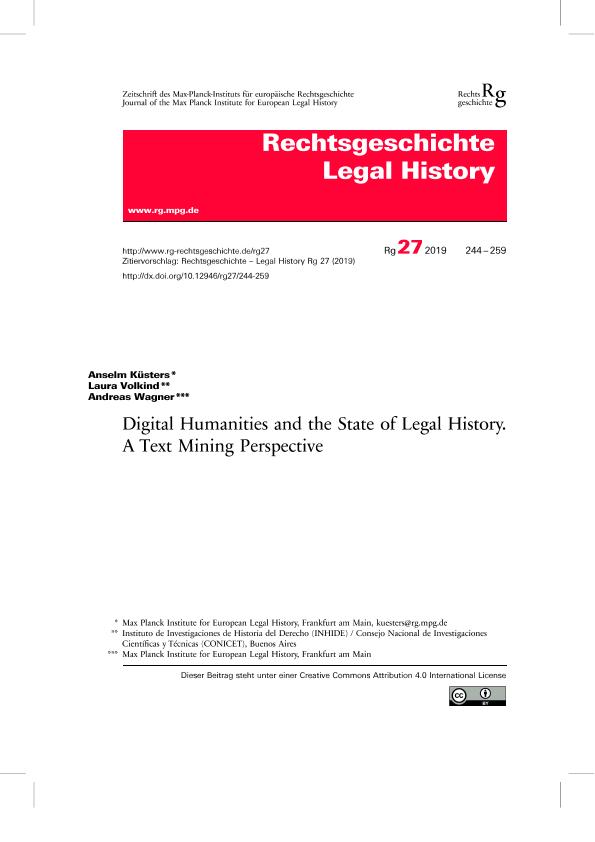Mostrar el registro sencillo del ítem
dc.contributor.author
Küsters, Anselm
dc.contributor.author
Volkind, Maria Laura

dc.contributor.author
Wagner, Andreas
dc.date.available
2022-09-27T16:41:23Z
dc.date.issued
2020-09
dc.identifier.citation
Küsters, Anselm; Volkind, Maria Laura; Wagner, Andreas; Digital humanities and the state of legal history: A text mining perspective; Max Planck Institute for European Legal History; Rechtsgeschicht; 2020; 27; 9-2020; 244-259
dc.identifier.issn
1619-4993
dc.identifier.uri
http://hdl.handle.net/11336/170658
dc.description.abstract
For reasons of curiosity, we perused the two recent Oxford handbooks on legal history looking for discussions of digital methods in legal history. One of the fundamental decisions to be made when organizing such a handbook is defining which methodological approaches deserve an article of their own and which ones are to be understood rather as cross-cutting themes to be discussed in the context of many articles dedicated to other things. In the case of digital methods in legal history, this decision seems to have been a tough one – at one point, you can find a curious reference to a »chapter on ›Legal History and Digital Humanities‹« (OHBLH 354), but in the final publication there is no such text. However, discussing digital methods in the context of other subjects has, in our opinion, the disadvantage that more systematic, methodological arguments cannot really be developed. Put more concretely, the most ›substantial‹ contributions regarding digital methods are, for whatever reason, those on »The Intellectual History of Law« by Assaf Likhovski, on »Taking the Long View« by Paul D. Halliday, on »Quantitative Legal History« by Daniel Klerman, and on »Indian Law« by Mitra Sharafi, all of which are in the Oxford Handbook on Legal History. (Equally surprising, there is no mention of digital methods at all in Angela Fernandez’s »Legal History as The History of Legal Texts«.) However, even these articles do not really ›discuss‹ digital methods, rather they merely refer to them (and to some projects) as contributions of sorts to their respective fields of interest. Thus, if you are looking for digital methods in those handbooks, you can hardly find more than some namedropping passages where things like »digital mapping […], network analysis […], text analysis« (OHBLH 845f.) are mentioned, together with references to example projects where they have been employed but without any explanation as to: – why these methods are mentioned and not others, – what they are doing, to which end and under what circumstances, – what, possibly transformative, impact these methods have on the (respective sub-) field of legal history, and – what a scholar considering to apply these methods should be aware of. While the space for this is limited, the present Forum contribution tries to mitigate the scarcity of such discussions by presenting and discussing a few textual analyses that make use – for demonstration purposes – of digital methods. Some other methods of analysis, network analysis, and geo-mapping (among others), cannot be covered here, but we provide a link to an online bibliography where you can find them applied to legal history or a related domain, and discussed critically. A general discussion of digital perspectives beyond concrete methods of analysis concludes this contribution.
dc.format
application/pdf
dc.language.iso
eng
dc.publisher
Max Planck Institute for European Legal History
dc.rights
info:eu-repo/semantics/openAccess
dc.rights.uri
https://creativecommons.org/licenses/by/2.5/ar/
dc.subject
Digital Humanities
dc.subject
Legal History
dc.subject
Text Mining Perspective
dc.subject.classification
Otras Derecho

dc.subject.classification
Derecho

dc.subject.classification
CIENCIAS SOCIALES

dc.title
Digital humanities and the state of legal history: A text mining perspective
dc.type
info:eu-repo/semantics/article
dc.type
info:ar-repo/semantics/artículo
dc.type
info:eu-repo/semantics/publishedVersion
dc.date.updated
2022-09-26T17:50:37Z
dc.identifier.eissn
2195-9617
dc.journal.volume
2020
dc.journal.number
27
dc.journal.pagination
244-259
dc.journal.pais
Alemania

dc.journal.ciudad
Frankfurt
dc.description.fil
Fil: Küsters, Anselm. Max-planck-institut Für Europäische Rechtsgeschichte.; Alemania
dc.description.fil
Fil: Volkind, Maria Laura. Instituto de Investigaciones de Historia del Derecho; Argentina. Consejo Nacional de Investigaciones Científicas y Técnicas; Argentina
dc.description.fil
Fil: Wagner, Andreas. Max-planck-institut Für Europäische Rechtsgeschichte.; Alemania
dc.journal.title
Rechtsgeschicht
dc.relation.alternativeid
info:eu-repo/semantics/altIdentifier/url/http://rg.rg.mpg.de/en/article_id/1257
dc.relation.alternativeid
info:eu-repo/semantics/altIdentifier/doi/http://dx.doi.org/10.12946/rg27/244-259
Archivos asociados
